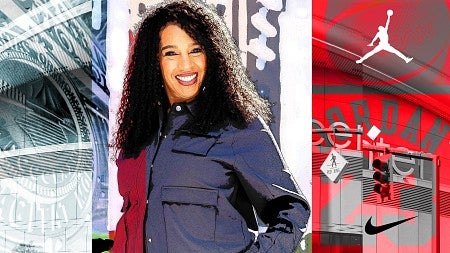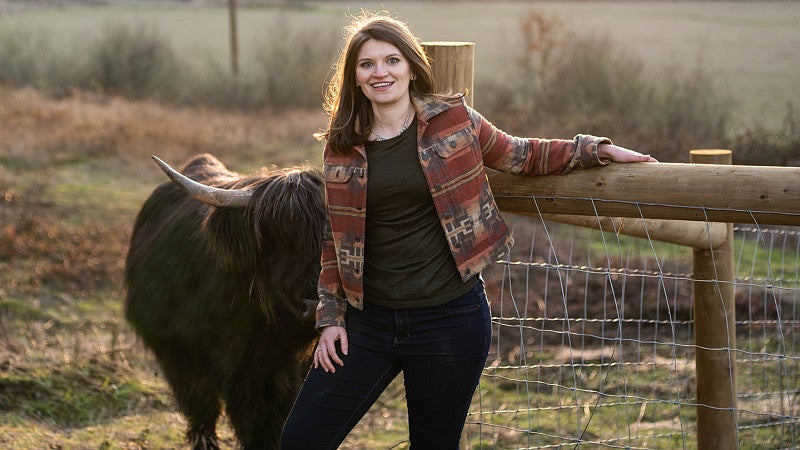
Fab Five: What I’ve Learned about Building a Business
From sustainable spirits to pet products, alumni share the inspirations underpinning their endeavors
By Alice Tallmadge • Photo by Dan Cronin • April 12, 2023
11 min read“Success is 10 percent inspiration and 90 percent perspiration.”
This famous quote from Thomas Edison notwithstanding, entrepreneurs know that hard work alone is meaningless without a great idea driving it. So say five University of Oregon alumni who trace their business ventures to an idea—an observation, a revelation—that compelled them to chart their own course.
Their companies could scarcely be more disparate. But in the profiles that follow, each alum points to a moment of inspiration—of imagination—when they recognized unfettered opportunity amid the limitations of the status quo.
- Emily Darchuk: Do Things Differently for the Right Reasons
- Marcus Harvey: Hustle and Make It Cool
- Anne Marie Levis: Solve a Problem
- Nathan Lillegard: Repeat After Me—“I Can Do It”
- Aisha LuVert: Why Not Be That Person
Emily Darchuk: Do Things Differently for the Right Reasons
The logo for Wheyward Spirit, a distilled alcohol made from whey, a dairy by-product, features a Highland Coo cow with unkempt hair, pointed horns, and a determined jaw. The image is fitting, says Wheyward Spirit founder Emily Darchuk, MBA ’18.
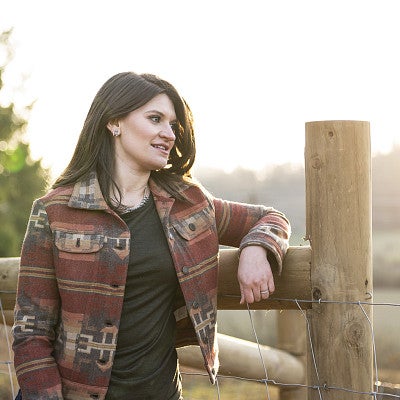
“She has that ‘long hair, don’t care’ Wheyward spirit,” says Darchuk. “I fell in love with her. She has horns but she’s not a bull. She’s a different type of cow representing a different type of spirit.”
Darchuk, too, goes her own way. A food scientist by training and experience, she’s also committed to natural foods and sustainability. Once she learned about the billions of gallons of whey discarded during the cheese-making process, it was only natural that she figured out how to create a new product from a by-product: a distilled spirit from whey. Farm to flask, she calls it.
“I saw an opportunity to do things differently for the right reasons,” she says. “It’s that Wheyward mentality.” Darchuk had the science chops but not the business acumen to build and market her product. She enrolled in the Oregon MBA program at the University of Oregon’s Lundquist College of Business, pursuing a specialization in innovation and entrepreneurship, and set about learning the basics: creating a business plan, pitching, incorporating feedback, and retooling, again and again.
“Everyone was encouraged to do their own thing,” she says. “You were able to continually improve and be in a community of other people doing the same thing. That is a really powerful environment for innovation.” Wheyward Spirit’s public debut was set for early 2020. “We were locked and ready to go,” she says. “Then COVID hit.” It could have been a disaster but, she says, her UO program taught her how to pivot. She dumped her business plan and grew her company online. She made connections and built partnerships, including helping Ben and Jerry’s resurrect their long-discontinued flavor, Dublin Mudslide, with the new rendition featuring Wheyward Spirit. Today, Wheyward Spirit is available for purchase from their website and in stores across Oregon, the Midwest, and soon Whole Foods stores throughout California. It has garnered positive press in the New York Times, Travel + Leisure, Sip, and Eating Well.
Darchuk is a member of the business school’s Forty Under 40 Advisory Board, which advances the school’s mission by providing strategic advice concerning goals, policies, and programs. She says her success is in part because others—namely UO business school alums—have lent a hand, a story, or an encouraging word when she most needed it.
“A lot of us have taken an unconventional path,” she says. “I love connecting with them and hearing about their business journey, how they navigated, and where they are today.”
Marcus Harvey: Hustle and Make It Cool
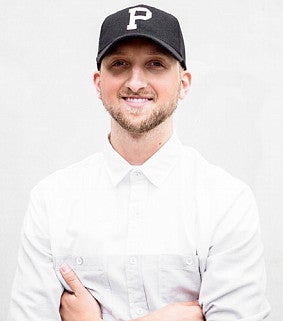
Some novice entrepreneurs follow the rule book. Others fly by the seat of their pants. Marcus Harvey, BS ’12 (digital arts), founder of the apparel brand Portland Gear, did the latter. Nine years later he is still soaring high.
“My first day I sold $5,000 worth of T-shirts. I kept making more stuff and cooler stuff and promoting it through Instagram and social media. It became my full-time job the first day I started it,” he says. Along with selling online, Portland Gear has two brick-and-mortar stores. A third opens soon.
It didn’t hurt that Harvey had nabbed the Instagram handle @Portland a year before he started his business in 2014. He mostly used it to promote events and post photos of Portland. While his idea of an apparel company germinated, his follower numbers mushroomed into tens of thousands, he says, “who loved Portland like I did.” Unlike most entrepreneurs, he amassed potential customers before having a product to sell them.
Harvey—now using @portlandgear—had dabbled with designing and selling skateboard-themed T-shirts while at the UO, hawking them door-to-door in his dorm for twenty bucks each. “It’s where I learned everything,” he says. He applied what he was learning in College of Design graphic arts classes—Adobe Illustrator, Adobe Photoshop, color, typography—to his brand. He didn’t think to seek out business mentors. “I didn’t know what I was doing—I was just hustling and making stuff I thought was cool.” As an undergrad he learned to value building community—his fraternity brothers, classmates, friends. “I love being surrounded by people,” Harvey says. “At the UO I developed my people side, my community side, my care for others.” Today, Harvey gives back by speaking to high school and college students about creating and running a small business: the risks, failures, and successes; the time it takes; the commitment to employees, customers, and creativity. For the past several summers, in partnership with the UO, he has held two weeklong “brand camps” for high school and college students interested in graphic arts, apparel, business marketing, and entrepreneurship. The camps are held at the White Stag building in downtown Portland.
“The students learn about sports product design and product management,” he says. “I get to brainwash them all to be Ducks. It brings me a lot of joy.”
Anne Marie Levis: Solve a Problem

It’s a wonder Anne Marie Levis, MBA ’96, still loves owning and running Funk/Levis & Associates, the Eugene marketing and communication business she took over in 1997. Many of her clients are people, institutions, or municipalities in crisis. Either their business is tanking, their image is on the rails, or they are facing public pushback. But where most people see a complex, thorny mess, Levis sees challenge.
“I see myself as a problem solver,” she says. “My MBA program gave me confidence in problem-solving. That’s my job.” Levis says that, overall, her MBA program was “a springboard for the trajectory of my career.” In addition to arming her with problem-solving skills, the program provided the financial know-how necessary to run a business. It also introduced her to the value of working in groups.
“What I took out of the program is ‘we’re always better together.’ Minds around a table to solve a problem or come up with a big idea is the way to do things.” She paraphrases a favorite maxim: “If you want to go fast, do it alone. If you want to go far, do it together.”
Even now, twenty-seven years later, Levis continues to rely on group process. “When I am working through a difficult issue with a client, I work with several team members. Seeing things through their perspective is so helpful. It doesn’t matter who comes up with an answer. I recognize it when it happens.”
Her gut tells her when an idea rings true. “I hear something, it sticks with me, and I can’t forget it.” Yes, an effective message has to include solid reasoning, she says—“but it has to hit in the heart. It has to elicit an emotional response.”
Many of the issues Levis’s former clients were dealing with are too sensitive for her to discuss. But some problems were less weighty. Levis’s company helped retool the image of a suburban commuter city from that of a car-choked byway to a community characterized by parks, diversity, and vibrant economic development. For another client, her company used video storytelling to reframe the image of a corporate acquisition from greedy takeover to affable partnership.
“I am a ‘yes’ person,” she says. “I have an optimistic perspective. My attitude is, ‘I don’t know how, but we’ll figure it out.’”
Nathan Lillegard: Repeat After Me—“I Can Do It”
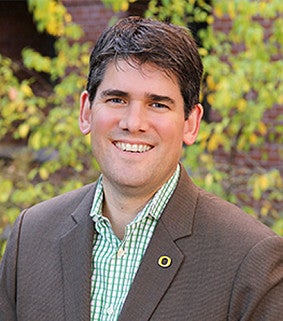
Nathan Lillegard, BA ’98 (planning, public policy and management), MBA ’06, instructor at the Lundquist College of Business, tells his students there are two ways to approach starting a business.
One, the most common, is to find a problem—or niche, or vacancy—that people care about, then figure out how solve it in a way that makes money. The problem has to be migraine-level, he cautions, not equivalent to a hangnail. “If the problem is just an annoyance, people won’t pay to solve it.”
The second approach is a 180-degree pivot: come up with a technology that does something novel, then figure out who cares enough to pay to use it.
That is the path that Lillegard and his business partner Eric Johnson followed in 2007 when they formed Floragenex, a genomics research company.
Johnson, a UO associate professor of biology, had devised a way to “slice and dice” DNA into a library of fragments that could be used in research. Lillegard, who confesses he took just one college biology class, handled the business end, doing enough research to know they were on a viable trajectory and seeking the appropriate consumers market. His first target group—plant breeders—didn’t offer the path to market the company needed. He eventually connected with targeted research projects, such as a whale researcher whose challenge their technology could solve—determining if there were one or two populations of blue whales in the Pacific Ocean. Word got out and Floragenex was on a roll, serving researchers around the world working with plant and animal species.
“As we evolved the business, we found customers who needed to solve problems that we could solve,” Lillegard says. “And were willing to pay for it.” He separated from Floragenex in 2012. The company was acquired by Portland-based Sedia Biosciences in 2013 and continues to thrive.
Entrepreneurs come in many forms, Lillegard says, but one trait they have in common is unwavering determination: “They have the attitude, ‘I can do it. I’m going to figure out how to make it happen.’”
Staff and faculty in his MBA program helped foster that mindset. “I got enough positive feedback and encouragement that I felt like I had something worth pursuing,” he says. “Nobody said, ‘this is a terrible idea—it will never work.’ It gave me the confidence to keep going. And that’s the ecosystem you want to build in a university—help students feel like they can do it.”
Aisha LuVert: Why Not Be That Person
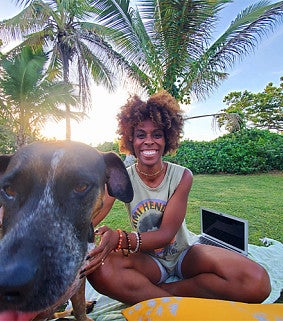
The spark for Aisha LuVert’s natural pet product company, Emisha Wellness, came out of a crisis: one of her beloved dogs had developed a seizure disorder, and LuVert wasn’t comfortable with the medication the vet had prescribed. LuVert, BS ’03 (general science), was in the waiting room agonizing over whether to start her dog on the medication when two policemen came in with their injured K-9 partner. While they were at the front desk, she overhead one of them say, “What are we going to do—give our dog weed?”
The fuse was lit. LuVert ended up giving her dog a CBD remedy, and his seizures immediately stopped. “I was, like, how did I forget how cannabis has been such an ally to those who have seizure disorders?” LuVert remembers. “I had wanted to treat my dog in a different way. And then I hear an opening.”
At the UO, LuVert dove into the sciences available in the College of Arts and Sciences, majoring in general science and minoring in chemistry and biology. “It’s where I got the base for a lot of the work I did in my career,” she says. Her experience in biomedical research and medications required her to dig for answers, and she scoured the internet for information on CBD. She wasn’t planning on starting a business—she simply wanted to assure her two dogs healthy, long lives.
She asked pediatricians, pharmacists, and other medical professionals about safe, effective natural products to use with pets, and discovered they knew little more than she did.
“I was expecting them to have the information,” she says. “I would have loved to have had someone to trust, to lean on. Over time I thought, ‘Why not be that person for other people?’”
It took a few years before LuVert had amassed the knowledge she felt she needed. She opened Emisha Wellness in 2018, offering soft CBD dog chews, a pet detox formula, mushrooms, and teas that promote vitality, health, and immunity. Many of her products are human grade.
At the UO, LuVert was often the only Black person in her classroom. She learned the value of speaking up when her perspective wasn’t being included. With Emisha Wellness, she says, she wants to expand the community conversation on health to include earth medicine for the entire family.
Both her dogs lived for more than sixteen years, and she wants others to know they have options when it comes to health and longevity.
“Having multiple pathways to wellness should be for every family who can benefit,” she says.
Alice Tallmadge, MA ’87 (journalism), is an editor for Oregon Quarterly. She has been a reporter, writer, and editor over a career that included stints with the Oregonian and Eugene Weekly. She was an adjunct instructor at the University of Oregon School of Journalism and Communication from 2008 to 2014.


